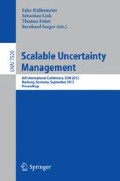Abstract
This paper addresses the task of helping investigators identify characteristics in credit-card frauds, so as to establish fraud profiles. To do this, a clustering methodology based on the combination of an incremental variant of the linearised fuzzy c-medoids and a hierarchical clustering is proposed. This algorithm can process very large sets of heterogeneous data, i.e. described by both categorical and numeric features. The relevance of the proposed approach is illustrated on a real dataset containing next to one million fraudulent transactions.
Access this chapter
Tax calculation will be finalised at checkout
Purchases are for personal use only
Preview
Unable to display preview. Download preview PDF.
References
Banque de France: Annual Report of the Observatory for Payment Card Security (2010), http://www.banque-france.fr/observatoire/telechar/gb/2010/rapport-annuel-OSCP-2010-gb.pdf
Bolton, R.J., Hand, D.J.: Statistical fraud detection: a review. Statistical Science 17, 235–255 (2002)
Phua, C., Lee, V., Smith, K., Gayler, R.: A comprehensive survey of data mining-based fraud detection research. Artificial Intelligence Review (2005)
Laleh, N., Azgomi, M.A.: A taxonomy of frauds and fraud detection techniques. Information Systems, Technology and Management Communications in Computer and Information Science 3, 256–267 (2009)
Krishnapuram, R., Joshi, A., Nasraoui, O., Yi, L.: Low complexity fuzzy relational clustering algorithms for web mining. IEEE Transactions on Fuzzy Systems 9, 595–607 (2001)
Cheng, T.W., Goldgof, D., Hall, L.: Fast fuzzy clustering. Fuzzy Sets and Systems 93, 49–56 (1998)
Altman, D.: Efficient fuzzy clustering of multi-spectral images. In: Proc. of the IEEE Int. Conf. on Fuzzy Systems, FUZZ-IEEE 1999 (1999)
Kaufman, L., Rousseeuw, P.: Finding groups in data, an introduction to cluster analysis. John Wiley & Sons, Brussels (1990)
Ng, R., Han, J.: Efficient and effective clustering methods for spatial data mining. In: Proc. of the 20th Very Large DataBases Conference, VLDB 1994, pp. 144–155 (1994)
Hathaway, R., Bezdek, J.: Extending fuzzy and probabilistic clustering to very large data sets. Computational Statistics & Data Analysis 51, 215–234 (2006)
Hore, P., Hall, L., Goldgof, D.: A cluster ensemble framework for large data sets. Pattern Recognition 42, 676–688 (2009)
Farnstrom, F., Lewis, J., Elkan, C.: Scalability for clustering algorithms revisited. SIGKDD Explorations 2(1), 51–57 (2000)
Hore, P., Hall, L., Goldgof, D.: Single pass fuzzy c means. In: Proc. of the IEEE Int. Conf. on Fuzzy Systems, FUZZ-IEEE 2007, pp. 1–7 (2007)
Hore, P., Hall, L., Goldgof, D., Cheng, W.: Online fuzzy c means. In: Proc. of NAFIPS 2008, 1–5 (2008)
Ester, M., Kriegel, H.P., Sander, J., Wimmer, M., Xu, X.: Incremental clustering for mining in a data warehousing environment. In: Proc. of the 24th Very Large DataBases Conference, VLDB 1998, pp. 323–333 (1998)
Zhang, T., Ramakrishnan, R., Livny, M.: Birch: an efficient data clustering method for very large databases. In: Proc. of the ACM Int. Conf on Management of Data, SIGMOD 1996, pp. 103–114. ACM Press (1996)
Guha, S., Rastogi, R., Shim, K.: CURE: an efficient clustering algorithm for large databases. In: Proc. of the ACM Int. Conf on Management of Data, SIGMOD 1998, pp. 73–84 (1998)
Bradley, P., Fayyad, U., Reina, C.: Scaling clustering algorithms to large databases. In: Proc. of KDD 1998, pp. 9–15. AAAI Press (1998)
Sander, J., Ester, M., Kriegel, H.P., Xu, X.: Density-based clustering in spatial databases: the algorithm DBSCAN and its application. Data Mining and Knowledge Discovery 2(2), 169–194 (1998)
Hathaway, R., Bezdek, J.: Nerf c-means: non euclidean relational fuzzy clustering. Pattern Recognition 27, 429–437 (1994)
Hathaway, R., Bezdek, J., Davenport, J.: On relational data versions of c-means algorithms. Pattern Recognition Letters 17, 607–612 (1996)
Author information
Authors and Affiliations
Editor information
Editors and Affiliations
Rights and permissions
Copyright information
© 2012 Springer-Verlag Berlin Heidelberg
About this paper
Cite this paper
Lesot, MJ., Revault d’Allonnes, A. (2012). Credit-Card Fraud Profiling Using a Hybrid Incremental Clustering Methodology. In: Hüllermeier, E., Link, S., Fober, T., Seeger, B. (eds) Scalable Uncertainty Management. SUM 2012. Lecture Notes in Computer Science(), vol 7520. Springer, Berlin, Heidelberg. https://doi.org/10.1007/978-3-642-33362-0_25
Download citation
DOI: https://doi.org/10.1007/978-3-642-33362-0_25
Publisher Name: Springer, Berlin, Heidelberg
Print ISBN: 978-3-642-33361-3
Online ISBN: 978-3-642-33362-0
eBook Packages: Computer ScienceComputer Science (R0)

